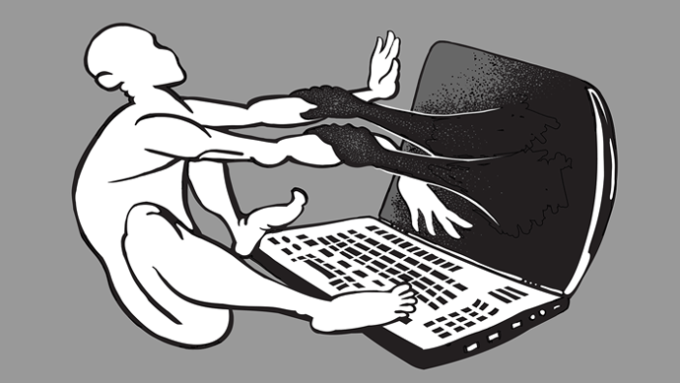
The Social Media Trap – The Reason For Failure

The world Works on Delusions
Your Instagram and TikTok For You page might be flooded with motivational quotes, self-improvement reels, and “GymToks.” The endless stream of content can make you feel like you’re on a journey of self-growth, as if simply watching others succeed brings you closer to success. But the hard truth is, passive consumption isn’t progress—it’s a trap.
Your reels might give you tips on how to become better. For Example: you might be getting study techniques from your reels, you might be getting nutritional and fitness advice from your reels, you might be getting mental health advice from your reels. However, the question you need to ask yourself is: are you acting on the knowledge you have gained? Or are you just watching these reels and taking no action to actually improve yourself in those areas? Watching study techniques wont get your studying done, and watching Gym tips wont magically grow muscle. This is when your goals turn into dreams. Leonardo da Vinci conceptualised many groundbreaking inventions—flying machines, tanks, and even scuba gear. However, most of his ideas remained sketches, never built or tested in his lifetime. His genius was undeniable, but without action, his designs remained theoretical. Always remember that knowledge is nothing without action.
Social Media provides you with instant gratification as well, which spikes dopamine in your brain. However this is artificial dopamine, as it is triggered for a short period of time by wathing these reels and making you feel like you are achieving things. Instead it is imperative that we chase real dopamine from natural activities.
Read more about Dopamine in my article titled “Dopamine”
Comparison
Instead of focusing on their own self-growth, many people fall into the trap of endless comparison with influencers who showcase only the most polished and successful moments of their lives. Social media highlights the final results—six-pack abs, a perfect study routine, financial success—without revealing the struggles, failures, and years of effort behind them. This selective portrayal creates an illusion of effortless success, making personal growth feel unattainable.
As a result, many people begin to question their own progress, feeling as if they are always behind. Instead of using inspiration as fuel for action, they become overwhelmed by unrealistic expectations. The thought of not measuring up can lead to paralysis—procrastinating instead of starting, consuming content instead of working, and endlessly waiting for the “perfect” time to begin.
The key to breaking free is to shift the focus inward. Instead of comparing yourself to someone else’s highlight reel, measure progress based on your own past self. Small, consistent actions—going to the gym even when unmotivated, studying without the perfect aesthetic setup, working on a skill without instant results—are what truly lead to self-improvement.
How Do I Escape?
From someone who has been stuck in this trap before, it is definitely not easy to escape.
To break free, setting clear time boundaries is the first step. App timers like Screen Time on iPhones or Digital Wellbeing on Android can help limit the amount of time spent on social media. Another effective strategy is implementing a “No scrolling before noon” and “No scrolling after 10p.m.” rule, allowing your mornings and nights to be productive rather than consumed by distractions. During focus periods, using website blockers like Cold Turkey or Freedom can prevent temptation and ensure that time is spent on meaningful work.
Following the 80/20 rule is another way to shift the balance from passive consumption to real action. Instead of spending the majority of your time consuming content, aim to dedicate only 20% of your time to learning, watching, or getting inspired, while the remaining 80% should be spent taking action—whether it’s working out, studying, or building a skill. The key to growth isn’t absorbing endless information but actually applying it to things you want to succeed and improve in.

Replacing passive consumption with active learning is crucial. Instead of endlessly watching fitness reels, commit to following a structured workout plan and track your progress. Rather than consuming one productivity hack after another, pick a single habit and implement it consistently. If you find yourself constantly saving book recommendations, start reading one instead of letting them pile up. Progress happens when knowledge is applied, not just collected.
Auditing your feed is another effective way to ensure that social media serves you rather than distracts you. Unfollowing accounts that don’t provide actionable value and instead following creators who encourage real-world application can make a significant difference. Muting or removing content that makes you compare yourself to others, rather than inspiring you to act, helps create a more positive and productive online environment.
Using social media with intention is key to avoiding mindless scrolling. Before opening an app, set a clear goal, whether it’s checking messages, learning something new, or seeking specific information. Instead of browsing aimlessly, go directly to what you need, then exit once you’ve accomplished your purpose. Social media should be treated as a tool, not as an escape.
Replacing scrolling with real-life activities can make a huge difference in productivity and well-being. Going to the gym instead of watching GymToks, journaling rather than consuming aesthetic productivity videos, and working on side projects instead of binge-watching business advice reels are just a few ways to replace digital distractions with meaningful actions. Engaging in real conversations with people instead of forming parasocial relationships with influencers can also bring a sense of fulfilment that social media cannot provide.
Practicing a dopamine detox can further help in breaking free from the addictive nature of social media. Taking one day a week off from social media can reduce dependence on digital dopamine hits. Replacing excessive screen time with reading, exercising, or pursuing real hobbies can bring back a sense of balance. Learning to embrace boredom, rather than constantly seeking stimulation, can even spark creativity and deeper thinking.
All of the things mentioned above are much easier said than done. It will take you an incredible amount of discipline, dedication and commitment to actually stick to it.
It is essential that every time you think about quitting, you remember the reason you started. Remember the reason you started it all, and how carrying out these actions will bring about positive change and in the end success.

Dopamine release for different activities. You can refer to my article on Dopamine to Learn More!


